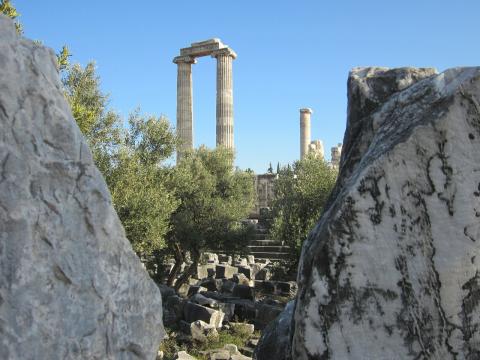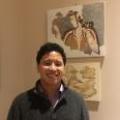Samuel Flores
June 19, 2020
In 2018, a group of scholars founded Mountaintop Coalition, an SCS-affiliated group with a shared interest in advancing the professional goals of Classicists who identify as members of ethnic groups traditionally underrepresented in the field. Mountaintop’s activities focus on practical issues of diversity, equity, inclusion, and access in professional settings. Shortly after its official launch and activities at the 2019 annual joint meeting of AIA-SCS, a group of students at Bryn Mawr College founded the first local chapter of Mountaintop. I recently had the opportunity to speak via email with Danielle J. Perry, the co-founder, co-coordinator, and president of Bryn Mawr Mountaintop, as well as a PhD candidate in Classical Studies at Bryn Mawr, about the group’s founding and activities.
(Note: This conversation has been edited for length and clarity.)
SOF: How did the Mountaintop Coalition-Bryn Mawr College (MC-BMC) chapter come about? What were the founding members’ hopes and aspirations for the group?
DJP: A Bryn Mawr alum, Wynter Douglas (they/their/them), had the idea to start a BMC chapter of Mountaintop after attending the AIA-SCS in 2019 and meeting some of the people involved in Mountaintop. Wynter reached out to some students of color at Bryn Mawr who they thought would be interested, and we all had lots of meetings in the spring of 2019. Our hope was to create a space for students of color in the humanities to come together and discuss some of the experiences we’ve had navigating our fields at predominantly white institutions. We also wanted to create a community for all the students of color to be able to identify and get to know each other. At Bryn Mawr, there was no email list or student organization for students of color in the humanities, so we hoped we could be that.
Figure 1: Bryn Mawr students at the spring 2019 SPEAK UPS conference. Image used with permission of Mountaintop Coalition-Bryn Mawr College.
SOF: What role do you think MC-BMC plays in classics, both as a community of students and scholars at Bryn Mawr and in the field of classics generally?
DJP: I think we have a twofold role:
1. To encourage early career scholars that there are spaces for them in the field of classics
2. To address inequities in departments as a unified group instead of just individually.
SOF: What types of events and activities has MC-BMC hosted? What were the aims of these events? What were the outcomes?
DJP: In spring 2019, we hosted a few small events for the members of the group (art therapy night, a movie night where we watched and discussed a performance of Luis Alfaro’s Electricidad, discussions about Humanities and Social Justice) and a large symposium at the end of the semester called SPEAK UPS. The symposium was a chance for grad students and undergraduates to present works relating to the theme of underrepresentation in the Humanities. We were intentional about asking students of color to participate and we also tried to get a good mix of graduate and undergraduate students, since the BMC chapter of Mountaintop is meant to cater to both graduate and undergraduate communities.
In fall 2019, after becoming a recognized student group on Bryn Mawr’s campus, we wanted to continue having discussion-based events while also equipping students for life in the humanities. To that end, we included more events focused on how to write an abstract, how to do a personal statement, how to use a citation manager, etc. These are skills that students often aren’t taught, but are expected to know.
This system of assumed-knowledge often has more negative impacts on students of color who aren’t receiving the same type of mentorship and advice as their white counterparts. To help fill in that mentorship gap, we also started a “Talk to an Academic” series where we invited scholars from Bryn Mawr (usually scholars of color or allies) to talk about their academic journey. Since these events were small, they gave students a chance to ask a professor a question that they likely would not have been able to ask in another setting. This helped students to begin to build relationships with professors in a low-stakes setting. For better or worse, relationships are so important to advancing in academia, so these low-pressure conversations were a first step to creating those relationships.
Figure 2: Bryn Mawr students at the spring 2019 SPEAK UPS conference. Image used with permission of Mountaintop Coalition-Bryn Mawr College.
SOF: How has the organization impacted life in BMC classics? What new opportunities has it provided?
DJP: Since we’re still a fairly new organization, our first goal has been to get people in the Classics department and related fields to know we exist. Fortunately, because Bryn Mawr is a small school, we have been able to build awareness pretty quickly. Also, events like last year’s symposium helped to get our names and faces out among the Classics/Humanities community. Since our events are aimed primarily at students of color and then secondarily at allies, we’ve been able to create a group where the voices and opinions of underrepresented groups are heard either through showcasing their scholarship or highlighting their initiatives. In addition to planning our own events, we also try to draw people’s attention to the other important stuff that’s happening in the Classics community right now and the groups behind them (e.g. Sportula, MRECC, Classics and Social Justice, etc.).
SOF: How do you plan to build on the organization’s successes and move forward into the future? What goals would you like to accomplish?
DJP: Since our inception, we’ve discussed the need for a mentorship network and that’s something we want to focus our attention on next year. We also want to continue to have symposia like the one we did last spring (we had begun organizing this year’s symposium, but the pandemic put an end to a lot of our spring semester plans). We also want to think about new ways of sharing knowledge and information. The conference paper method of sharing new ideas is the current status quo and so we understand that an important part of our role is to equip students of color to flourish within that system, but we also want to challenge that system. We had sent out a call for ideas (as opposed to the usual call for papers) before the pandemic hit and we hope we can find other ways to encourage people to share their work in non-traditional formats. The conference paper is a style of communication and presentation that privileges certain types of knowledge acquisition, but it overlooks many other valuable and more accessible ways to talk about and present Classics.
Figure 3: Bryn Mawr students at the spring 2019 SPEAK UPS conference. Image used with permission of Mountaintop Coalition-Bryn Mawr College.
SOF: If classics students at another institution were interested in opening their own Mountaintop chapter, what advice would you give them?
DJP: Find people who would want to be a part of what you’re doing and reach out to them. Wynter sent me and a few other students an email at the beginning of 2019 and that’s what really got the group started. I’d also encourage students to partner with grad students at their institution (if there are grad students) because they can provide some long-term stability to the group. Wynter was the spark that got the group started but, since they were a senior, they also knew that it was important to have people who could keep it running after they left. If there are no grad students at your school, try to find first or second year students who might be interested in getting involved. Also, be okay with reaching out to other humanities disciplines. I was the only grad student of color in the Classics department and Wynter was one of a few undergrads of color in Classics, so we expanded to include Archaeology, History of Art, History, and Philosophy. If you’re the only person of color in your program, consider collaborating with people from other humanities programs.
In the wake of recent acts of systematic racism and police brutality, especially against Black people in the United States, the field of classics has begun to reckon with the misappropriation of classics by white supremacist and nationalist groups, as well as the discipline and profession’s own role in perpetuating racist attitudes and ideas. Mountaintop Coalition is one of multiple organizations dedicated to empowering marginalized voices within the field of classics by providing a space and community for classicists of color. To learn more about Mountaintop Coalition, you can visit their website at www.mountaintopcoalition.org. You can also contact the organization via email, Facebook, and Twitter. To learn more about the Bryn Mawr College branch of Mountaintop Coalition, visit their website at www.mountaintopbmc.com. Links to other organizations supporting diversity and inclusion in classics, as well as resources on scholarship and teaching, can be found here.
Figure 4: Bryn Mawr students at the spring 2019 SPEAK UPS conference. Image used with permission of Mountaintop Coalition-Bryn Mawr College.
Authors


